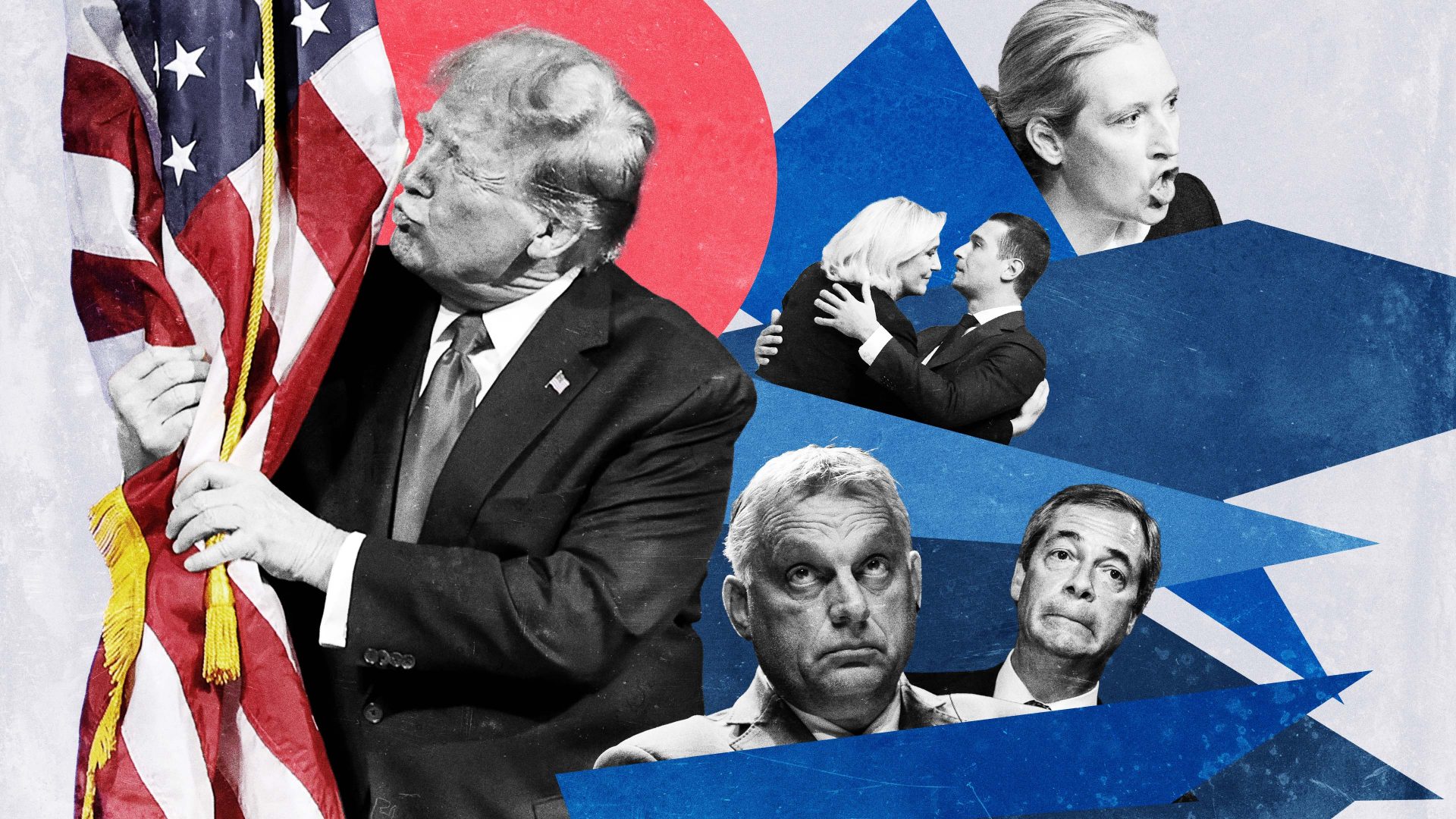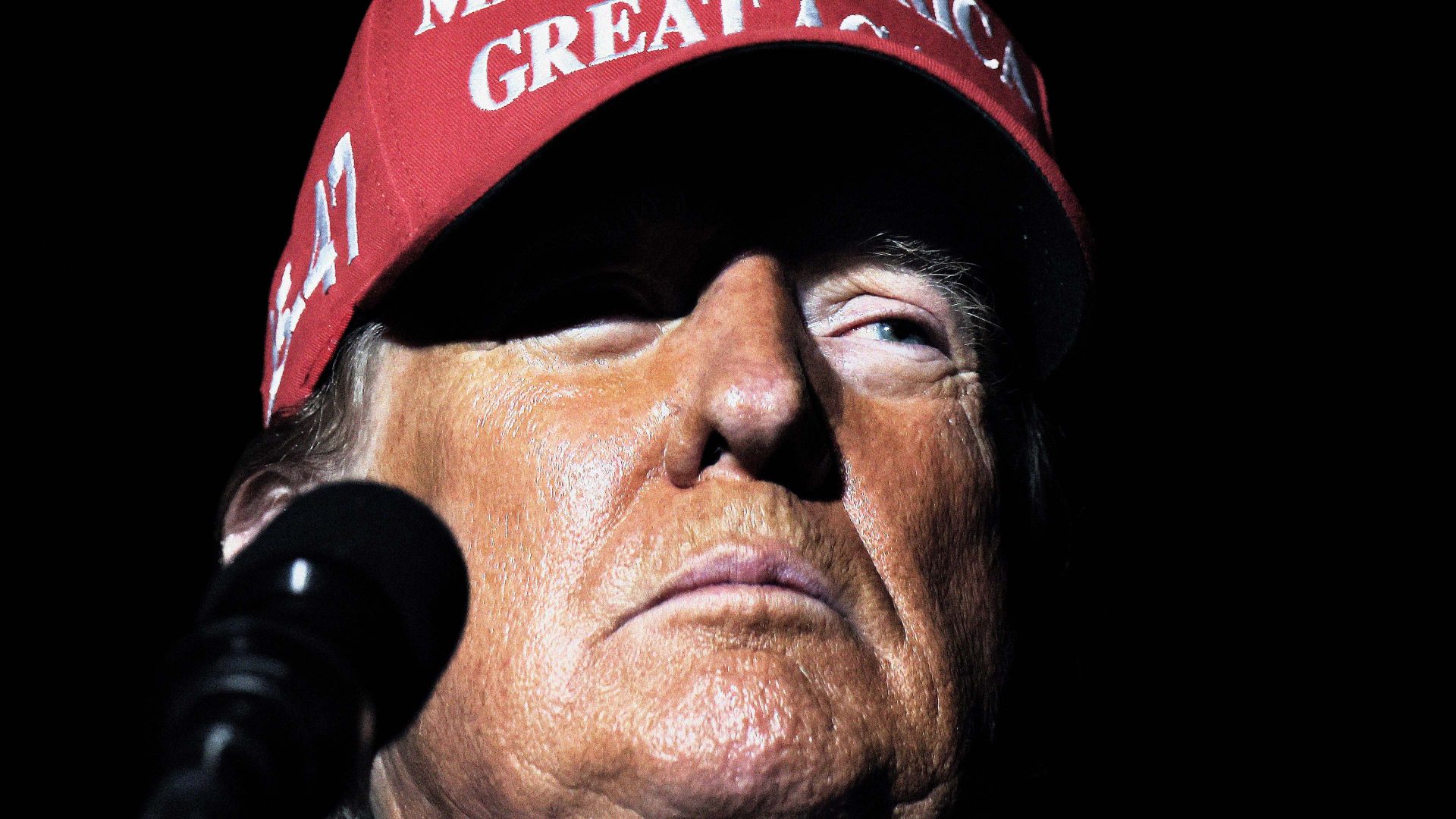Viktor Orbán knew exactly what he was doing when he chose MEGA, or Make Europe Great Again, as the official slogan of Hungary’s presidency of the Council of the EU. “It refers to the fact that member states are stronger together than apart,” says the Council’s website, trying to put a brave face on it. Spoiler: it doesn’t.
“We will open several bottles of champagne if Trump is back,” Orbán said in the first press conference of the presidency. The French National Rally leader Jordan Bardella agreed: “My heart leans towards Trump.” Alice Weidel, co-leader of the Alternative for Germany, conceded she wasn’t happy with the choice available, but “I’m definitely keeping my fingers crossed for Donald Trump.”
Others are more circumspect, especially if they quietly distanced themselves from Trump after his defeat in 2020. But many followers of European politics assume – and seemingly not without reason – that the return of a far right US president would be good for the populist right in Europe. Two-term Trump would “embolden” these politicians, says Luigi Scazzieri of the Centre for European Reform. “They will be less restrained in pushing forward ideas and policies that are socially conservative, anti-climate, anti-immigration, as these would again be normalised in the White House.”
Weidel and Orbán are particularly keen on Trump’s plan – which remains secret, to preserve the element of surprise – to end the war in Ukraine, apparently in 24 hours. “He will not wait for the inauguration ceremony in order to manage a peace. He will act immediately,” Orbán said, repeating an assurance Trump gave in the presidential debate with Kamala Harris. (This would, of course, be illegal)
“The election of Trump feeds into [Orbán’s] conviction that whatever the EU and other institutions are doing is completely and fundamentally misguided, and we need to get on board with this new world order that he’s been pushing,” says Marta Lorimer, a lecturer in politics at Cardiff University. “He sees this as part of a broader ideological project.”
For a leader like Orbán, who’s in the business of undermining global institutions, whether they are Nato, the UN or the EU itself, Trump is your man. If Trump wins again, well, congratulations – the most famous democracy in the world has just voted to embrace your kind of populist nationalism. New York-based NGOs might still nag you about the rule of law, but their influence will have fallen away. Once again, the president of the US says he is your friend. And while in 2016 populism might have looked like a brief Anglo-American spasm, in many parts of Europe the populist right is now either in coalition, in power, or on the brink of it. After this year’s elections, it also has a much firmer foothold in the European Parliament.
The European and American movements have already learnt from each other. Jeremy Shapiro and Zsuzsanna Végh recently wrote a long and powerful piece for the European Council on Foreign Relations setting out exactly how Orbán has trashed Hungarian democracy and how the people around Trump intend to use the same playbook to undermine American institutions. “They know how to create a nearly all-powerful presidency that could overwhelm Congress, dominate the media and civil society, and substantially intimidate the judiciary,” they write. It is debatable whether America, whose media and civil society are more mature and complex than Hungary’s, would be quite so easy to undermine. But Orbán has been in power for 14 years; Trump only had four.
The impetus to reach out to Europe did not necessarily come from the top. In some ways, Lorimer says, the people around Trump are more interested in cultivating an international alliance of nationalists than is the ex-president himself.
European populists have borrowed some of the softer communications tools of the American playbook. Orbán set up the CPAC Hungary network to mirror America’s equivalent, creating a platform for European conservative and populist thinkers, including the UK’s Matthew Goodwin. Giorgia Meloni’s heartfelt Instagram posts addressed to her young daughter (É tutto per te, “It’s all for you”) give an emotional edge to her defence of the traditional family. Sarah Palin was doing something similar in 2008.
If Trump’s return to the White House confirms the US turn towards authoritarianism, the pessimists warn, policies that were once taboo in Europe will become normalised. They see a future in which Germany elects a far right-led coalition in a year’s time, Marine Le Pen wins the next French presidential election, and the EU becomes steadily more powerless to act as a bloc. Gradually, member states that are under pressure to crack down on migration will introduce more and more border controls. Freedom of movement will become a thing of the past. Members continue to trade with each other, but the power of the EU as a negotiating bloc and an anti-nationalist force ebbs away.
Yet the story is not that simple. The populists who yearn for Trump’s return may find it brings fewer benefits than they expected. His protectionist instincts would certainly hit trade with China even harder, but if they extend to the EU, the bloc will suffer too. US-EU trade is worth more than $1tn and millions of European jobs depend on it.
Trump is convinced, in typical paranoid style, that the EU is taking advantage of the US in trade. “They’re not as tough as China, but they’re bad.” He imposed steel and aluminium tariffs on EU goods when he was president, and the EU retaliated with tariffs on motorbikes and whiskey. These have been paused under Joe Biden, but Trump will probably re-impose them and has threatened to bring in a levy of 10-20% on all imports to the US.
For the radical right in Europe, that is the nub of the problem with a Trump victory. At first, they may be delighted to find that voters will give even failed and ageing populists a second chance. But a fiercely protectionist US trade policy will have unwelcome consequences for Europeans, who will find themselves unable to export goods to America and paying high prices for US products when the EU retaliates in kind.
In the same way, if Trump does decide to pull out of Nato, Europeans – especially those that border Russia – may start to feel very vulnerable.
“Trump may well accelerate some patterns of European integration,” says Rob Ford, a professor of politics at Manchester University. “Nobody wants to be left out in the cold.” If Trump says to Nato, pay up or I’ll go, the security situation across Europe will suddenly feel chillier. “The more radical right parties will think, well, we’re going to have to stand on our own.” When Russia looks like a threat, will a nationalist party on friendly terms with the Kremlin have the same appeal?
Trump is personally unpopular in Europe, which doesn’t help the radical right cause either. “If Trump proves to be really toxic with European electorates, that might put a ceiling on their support… I think it will leave all of them in a quandary. People like Orbán may benefit, America may chuck money at Hungary. But if anyone thinks Trump Republicans
are going to throw money at the European radical right, I’ve got a bridge to sell you.”
Lorimer is less optimistic about that, pointing out that when people are insecure and afraid they tend to vote for people who say they will protect them, rather than mainstream conservatives. Even if that amounts to a promise to appease Russia, it may still cut through. Pro-Putin sentiment is not confined to the right. Sahra Wagenknecht, the left-populist leader who has picked up a lot of support in the east of Germany, regards a good trading relationship with Russia as crucial to energy security.
Much may depend on which way Giorgia Meloni jumps. A Trump win would force her to make a difficult choice. If she decides to cut support to Ukraine after defending it for so long, “she’s going to have to explain why,” says Lorimer. Scazzieri thinks she will simply take her cue from him. “If he proposes a peace initiative, she will probably back it. If he cuts off assistance to Ukraine, it’s likely that Italian support will also decrease. But if Trump surprises us, and continues to support Ukraine, then Meloni would do that too.”
Whether he is elected or not, the fact is that the EU is already drifting rightwards. “These parties are doing fine by themselves,” says Lorimer. “They don’t need Trump. If he wins, we’re going to see several complimentary tweets saying, ‘it’s wonderful to have you back’. But concretely, I don’t see how that translates into greater success that they wouldn’t have been able to have without Trump.”
Success for these parties does not necessarily mean winning power. It means ensuring that the EU and national governments adopt their policies. “Other parties seem to have decided that the solutions are those of the radical right,” says Lorimer, citing Keir Starmer’s discussions with Meloni about her deal to deport migrants and process them in Albania. When France tightened its migration laws last year, Marine Le Pen called it an “ideological triumph” for the National Rally.
Germany has begun to reintroduce border controls in the Schengen area, where movement is supposed to be free. Even Donald Tusk has announced that he will suspend asylum applications because Belarus and Russia have been pushing migrants towards Poland. Only eight years ago, the European Commission decided that processing migrants outside the EU was essentially illegal. Now Ursula von der Leyen wants to “develop” the idea of “return hubs outside the EU”, inspired by Italy’s deal with Albania. The motivation is entirely understandable: in the same way that the Conservatives doubled down on the Rwanda scheme in an effort to stop their voters going to Reform, mainstream politicians hope they can avoid European voters sliding further towards the populist right.
But if the real effect of a Trump victory on the European radical right would, as Lorimer suggests, be a bit “meh”, what does it mean for his biggest fan in the UK?
“I must admit I don’t bother him much,” Nigel Farage told GB News after an armed man was arrested near Trump on a golf course. “But I picked up the phone last night and spoke to him, and he answered the phone first ring … [he was] keen to talk about what was happening in Britain.”
“That’s mostly bullshit,” says Ford. “What is the strategic interest in Nigel for Trump’s people? It’s zero. Even if he gets a meeting or two, so what? Trump cares about power.” Most of Farage’s supporters do not like the ex-president. “To big up his relationship with Trump would be a major misstep.”
Indeed, with just a handful of MPs and a Labour supermajority, Farage is considerably less useful to Trump than any of Europe’s successful far-right leaders. If Kemi Badenoch wins the Conservative leadership contest he may even find himself eclipsed by a younger and more attractive figure, who can reach parts of the electorate still impervious to the Farage charm.
On the face of it, a Trump win looks like a shot in the arm for the populists. The truth is rather more complicated. The more audacious Trump proves to be in his dealings with Europe, the greater the risk of a backlash against his cheerleaders.
Ros Taylor hosts the Oh God, What Now?, Jam Tomorrow and Bunker podcasts, and is the author of The Future of Trust (Melville House)




